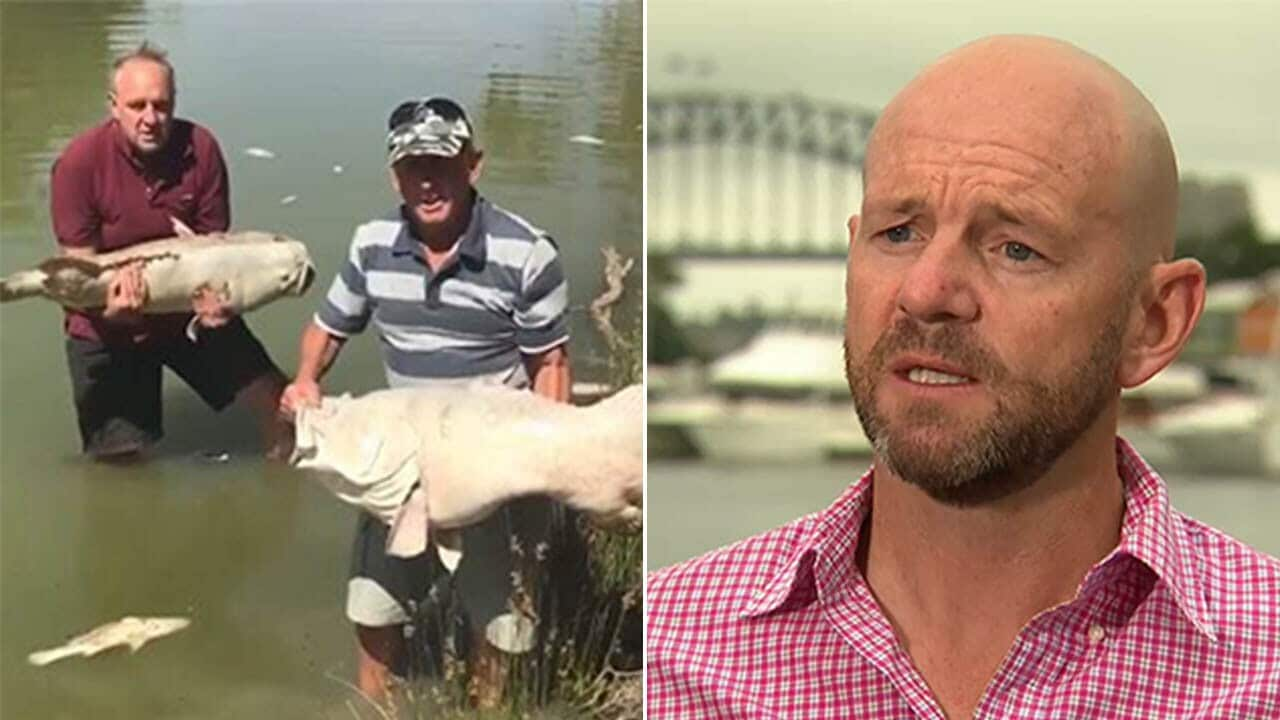NSW Primary Industries Minister Niall Blair has told SBS News he received "direct threats" from members of the public after up to a million fish were found dead in the Darling River system at Menindee, NSW.
Mr Blair was criticised by some locals who claim water levels are low because of the amount diverted to irrigators.
The minister ordered an urgent report from the Department of Primary Industries and WaterNSW into the "devastating" incident, which some residents have labelled a "man-made disaster", but he was ridiculed by locals who claim he avoided them during a visit to Menindee.

On Thursday, Mr Blair told SBS News he spoke with residents for 45 minutes, answering their questions over the incident despite "direct threats" made following the fish deaths.
"I did spend around 45 minutes, standing on the banks of the river, talking to the locals," he told SBS News.
"However due to the safety concerns and the threats that were made, we had to change locations as to where we got on and off the river."
"This is disappointing some people wanted to make those threats, but it didn't deter me going out there," he said.
Mr Blair said a number of factors including poor water quality and drought caused the deaths.
"Unfortunately this has been the fourth fish kill we have seen in regional NSW in recent months," he said.
"This is due to a lack of oxygen in the water. Blue/Green algae have built up in some of the water because of the low flows. There was a sudden drop in temperate and the algae died.
"That then depleted the oxygen in the water which has led to the fish kill."

Water has been released from the Menindee Lakes to South Australia under the Murray-Darling Basin Authority's approval and because of the drought there has been nothing to replenish the system, Mr Blair says.
"There have been different amounts of water released at different times. Some of it was to promote fish breeding events. Some of it is to go down to improve the health and sustain the communities in the lower Darling.
"And some of it has been sent down to South Australia. That is what happens with the Murray-Darling Basin plan."
The NSW Government is in talks with the Commonwealth about operating rules and water-sharing arrangements, he added.
On Wednesday while inspecting the river, Mr Blair was confronted by more than 100 angry residents demanding answers.
Rob McBride, a grazier who lives south of Menindee on the Lower Darling, insists the deaths are the result of a "man-made engineered disaster".
"It has everything to do with the total mismanagement and corruption of the water system," Mr McBride told AAP.
NSW Labor demand inquiry into fish deaths
The NSW opposition wants a special commission of inquiry into the state's water management after the mass fish death event in the Darling River system.
Labor leader Michael Daley on Thursday called on the Berejiklian government to establish the inquiry after up to a million fish died in the river at Menindee.
Mr Daley vowed if Labor was elected to government in March it would establish an inquiry with "royal commission-like powers".
"The scale of this disaster is extraordinary and unprecedented," the opposition leader said in a statement.
"The people of NSW have watched for 18 months as water theft scandals, water mismanagement and now ecological disasters have rocked far west rivers."
Premier Gladys Berejiklian assured angry residents in the region the government was working to find "solutions".
Cotton Australia's general manager said cotton growers were not to blame for the deaths.
"The recent fish deaths in the Barwon-Darling river system at Menindee was a devastating sight. However, it is wrong to blame cotton growers for this incident," Michael Murray said.
“About 18 months ago, 2,000 gigalitres of water was in the Menindee Lakes before the Murray-Darling Basin Authority took the deliberate decision to accelerate releases from Menindee to meet downstream requirements and reduce overall evaporation losses from the Lakes.
“In hindsight, this was probably a poor decision, but it does highlight the incredibly difficult task of managing flows in a manner that minimise losses, but ensures enough water is available for communities and the environment during extended severe droughts."

